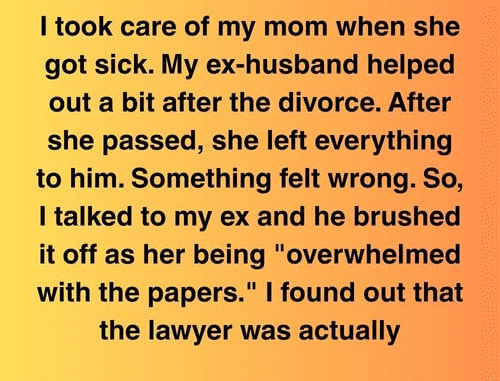
I was the one who cared for my mom when she got sick. My ex-husband helped occasionally, but I was there every day. After she passed, I discovered her will—and to my shock, she had left everything to him. Something about it felt wrong. When I confronted my ex, he brushed it off, saying Mom was “too overwhelmed with the paperwork.” But then I found out the so-called lawyer who drafted the will wasn’t just some estate attorney—he was my ex’s old college buddy. Not a professional my mom had ever trusted, not even someone she knew before her diagnosis.
My stomach twisted.
For context, my mom, Leena, was meticulous. She labeled spice jars, wrote birthday cards by hand, and never let important matters slide. Even when cancer weakened her, she insisted on handling her garden and paying her bills herself. She was cautious, rarely forgiving, and absolutely never careless. So when I saw that she had left her home, her savings, even her jewelry to Nasir—my ex—I knew something was wrong.
Nasir and I had divorced two years earlier. It wasn’t messy, but it was final. He had lost any role in my life, though my mom still thought of him kindly—especially since he occasionally drove her to chemo when I couldn’t. But to cut me, her only child, out of the will entirely? That was not her.
I asked him about the lawyer, “Caleb Drury.” The name rang a faint bell. Nasir claimed Mom had already hired him and that she just “trusted him.” His words didn’t match his tight jaw or the way he wouldn’t meet my eyes.
So, I started digging.
It turned out Caleb wasn’t a lawyer at all. He’d gone to law school but never passed the bar. No license. No authority. And worse—he and Nasir had gone to college together. There were photos online of them at parties, laughing side by side.
This wasn’t coincidence.
The office address listed on the will? A UPS Store mailbox. No law firm existed. My hands shook when I realized what I was looking at.
I couldn’t afford a top attorney, but I found Reina, a lawyer who handled estate fraud cases pro bono. She took one glance at the documents and said, “These notarizations are fake. And the witnessing isn’t legally valid.” She explained that for the will to be legitimate, it needed verified witnesses or proper notarization. It had neither.
“It’s fraud,” she said flatly.
Reina immediately froze the estate through the courts. In the meantime, I combed through Mom’s journals. She always scribbled down everything—shopping lists, doctor’s notes, stray thoughts. Then I found it:
“Nasir offered to bring someone to help with paperwork. Doesn’t feel right. Maybe wait for Miren.”
Miren—that’s me.
Her gut had told her something was off, but I hadn’t seen it in time.
At the hearing, Reina presented everything: the fake address, the nonexistent law license, the shady timing, and the missing legal witnesses. Then we showed the judge Mom’s journal entry. That’s when the case cracked open.
But Reina wasn’t finished. She presented bank records showing a $3,500 payment from Mom’s account to Caleb—two days before the will was updated. The check was signed not in her hand, but in a clumsy forgery. By Nasir.
The judge invalidated the will.
It should’ve felt like justice, but it felt like losing Mom all over again. First to cancer, then to betrayal. I cried in the courthouse parking lot until I couldn’t breathe.
Everything reverted to her original will, drawn up five years earlier: the house and savings to me, with smaller gifts to relatives and her church. Nasir got nothing. He tried to appeal, but when pressed in court, his story fell apart. By the end, he was fined for attempting fraud.
But Caleb? He disappeared. No trace, no address, nothing.
Months later, his sister called me. “He’s been pulling this scam for years. Preying on sick women, on families in grief. I warned him to stop.” Then she told me the news—Caleb had been arrested in Oregon for forging estate documents again. He was in prison.
I finally exhaled.
I moved into Mom’s house. The garden was wild with weeds, but I tended it each weekend, thinking of her in her big hat, smiling in the sun. That’s when I found a hidden letter in a kitchen drawer.
“Miren, if you’re reading this, something must have gone wrong. Please know it wasn’t for lack of love. I’ve always trusted you to find the truth. I’m so proud of you. Plant daffodils for me.”
I cried harder than ever, but with relief too.
In spring, I planted daffodils.
People say money brings out the worst in families. Maybe it does. But it can also bring out the best in those willing to fight—not for wealth, but for truth. For love. For memory.
If you ever find yourself in that fight, listen to your instincts. Paper can lie. People can lie. But your gut will tell you when something is wrong. Trust it.